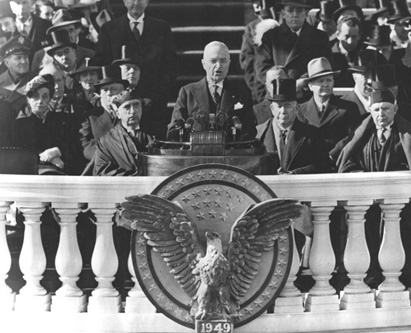Learn It
Following the death of president Franklin Roosevelt in 1945, Harry S. Truman became President of the United States on April 12, 1945. In 1949, Truman was elected to a second term during the early Cold War, a tense time when the U.S. and Soviet Union had begun competing for economic and military power. Truman’s Inaugural Address on January 20, 1949, reflected this tension.
Let’s take a look at several passages from the speech. Listen for the type of language Truman uses to describe the United States, our enemies and our allies. This language will help you identify Truman’s purpose and point of view. (Click the audio play button below to hear President Truman deliver this speech.)
President Harry Truman delivered his inaugural address amidst economic and political tensions.
The American people desire, and are determined to work for, a world in which all nations and all peoples are free to govern themselves as they see fit, and to achieve a decent and satisfying life. Above all else, our people desire, and are determined to work for, peace on earth…
In the pursuit of these aims, the United States and other like - minded nations find themselves directly opposed by a regime with contrary aims and a totally different concept of life.
That regime adheres to a false philosophy which purports to offer freedom, security, and greater opportunity to mankind. Misled by that philosophy, many peoples have sacrificed their liberties…
That false philosophy is communism.
Communism is based on the belief that man is so weak and inadequate that he is unable to govern himself, and therefore requires the rule of strong masters.
The United States is pre-eminent [a leader] among nations in the development of industrial and scientific techniques. The material resources which we can afford to use for the assistance of other peoples are limited.
We invite other countries to pool their technological resources in this undertaking. Their contributions will be warmly welcomed. This should be a cooperative enterprise in which all nations work together through the United Nations and its specialized agencies whenever practicable. It must be a worldwide effort for the achievement of peace, plenty, and freedom.
- Harry S. Truman, Inaugural Address, January 20, 1949. A video of the Inaugural Address can be viewed on C-Span.
At times during the speech, President Truman intentionally uses specific language and vocabulary to announce his purpose and show his point of view. Let’s take a closer look at the way he does that in his Inaugural Address.
President Truman's use of intentional language in his Inaugural Address helps us to identify the purposes of his speech, and provides a point of view as a U.S. president during the early Cold War. Next, you will practice identifying the use of language in another portion of President Truman's 1949 Second Inaugural Address.








